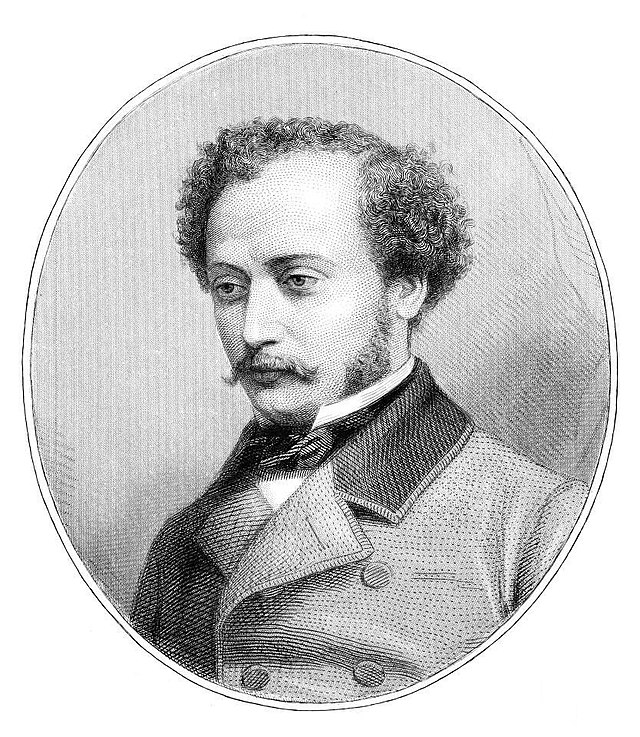Loading AI tools
French writer and dramatist (1824–1895) From Wikipedia, the free encyclopedia
Alexandre Dumas fils (French: [alɛksɑ̃dʁ dymɑ fis]; 27 July 1824 – 27 November 1895) was a French author and playwright, best known for the romantic novel La Dame aux Camélias (The Lady of the Camellias), published in 1848, which was adapted into Giuseppe Verdi's 1853 opera La traviata (The Fallen Woman), as well as numerous stage and film productions, usually titled Camille in English-language versions.
This article needs additional citations for verification. (September 2022) |
Alexandre Dumas fils | |
|---|---|
 Alexandre Dumas fils | |
| Born | Alexandre Dumas 27 July 1824 Paris, France |
| Died | 27 November 1895 (aged 71) Marly-le-Roi, Yvelines, France |
| Resting place | Montmartre Cemetery |
| Occupation | Writer, novelist, playwright |
| Period | Romanticism |
| Genre | Historical novel, romantic novel |
| Notable awards | Légion d'honneur (1894) |
| Spouse | Nadezhda von Knorring
(m. 1864; died 1895)Henriette Régnier de La Brière
(m. 1895) |
| Children | 2, Colette Dumas, Jeannine Dumas Hauterive |
| Parents | Alexandre Dumas Marie-Laure-Catherine Labay |
| Relatives | Alexandre Lippmann (grandson) Thomas-Alexandre Dumas (grandfather) |
| Signature | |
 | |
Dumas fils (French for "son") was the son of Alexandre Dumas père ("father"), also a well-known playwright and author of classic works such as The Three Musketeers and The Count of Monte Cristo. Dumas fils was admitted to the Académie française (French Academy) in 1874 and awarded the Légion d'honneur (Legion of Honour) in 1894.



Dumas was born in Paris, France, the illegitimate child of Marie-Laure-Catherine Labay (1794–1868), a dressmaker, and novelist Alexandre Dumas. In 1831 his father legally recognized him and ensured that the young Dumas received the best education possible at the Institution Goubaux and the Collège Bourbon. At that time, the law allowed the elder Dumas to take the child away from his mother. Her agony inspired the younger Dumas to write about tragic female characters. In almost all of his writings, he emphasized the moral purpose of literature; in his play The Illegitimate Son (1858) he espoused the belief that if a man fathers an illegitimate child, then he has an obligation to legitimize the child and marry the woman (see Illegitimacy in fiction). At boarding schools, he was constantly taunted by his classmates because of his family situation. These issues profoundly influenced his thoughts, behaviour, and writing.[citation needed]
Dumas' paternal great-grandparents were Marquis Alexandre-Antoine Davy de la Pailleterie, a Saint Dominican nobleman and Général commissaire in the Artillery in the colony of Saint-Domingue—now Haiti—and Marie-Cessette Dumas, an African woman enslaved by the Marquis. Their son Thomas-Alexandre Dumas became a high-ranking general of Revolutionary France.[1]
In 1844, Dumas moved to Saint-Germain-en-Laye, near Paris, to live with his father. There he met Marie Duplessis, a young courtesan who would be the inspiration for the character Marguerite Gauthier in his romantic novel La Dame aux camélias (The Lady of the Camellias). Adapted into a play, it was titled Camille in English and became the basis for Verdi's 1853 opera, La traviata, Duplessis undergoing yet another name change, this time to Violetta Valéry.[citation needed]
Although he admitted that he had done the adaptation because he needed the money, he had great success with the play, which started his career as a dramatist. He was not only more renowned than his father during his lifetime, but also dominated the serious French stage for most of the second half of the 19th century. After this, he virtually abandoned writing novels, though his semi-autobiographical Affaire Clémenceau (1866) achieved some solid success.[citation needed]
On 31 December 1864, in Moscow, Dumas married Nadezhda von Knorring (1826–April 1895), daughter of Johan Reinhold von Knorring and widow of Alexander Grigorievich Narishkin. The couple had two daughters: Marie-Alexandrine-Henriette "Colette" Dumas (born 20 November 1860), who married Maurice Lippmann and was the mother of Serge Napoléon Lippmann (1886–1975) and Auguste Alexandre Lippmann (1881–1960); and Jeanine Dumas (3 May 1867–1943), who married Ernest Lecourt d'Hauterive (1864–1957), son of George Lecourt d'Hauterive and his wife, Léontine de Leusse. After Nadezhda's death, Dumas married Henriette Régnier de La Brière (1851–1934) in June 1895, without issue.[citation needed]
In 1874, he was admitted to the Académie française and in 1894 he was awarded the Légion d'honneur.[citation needed]
Dumas died at Marly-le-Roi, Yvelines, on 27 November 1895, and was interred in the Montmartre Cemetery in Paris. His grave is some 100 meters away from that of Marie Duplessis.[citation needed]
Seamless Wikipedia browsing. On steroids.
Every time you click a link to Wikipedia, Wiktionary or Wikiquote in your browser's search results, it will show the modern Wikiwand interface.
Wikiwand extension is a five stars, simple, with minimum permission required to keep your browsing private, safe and transparent.